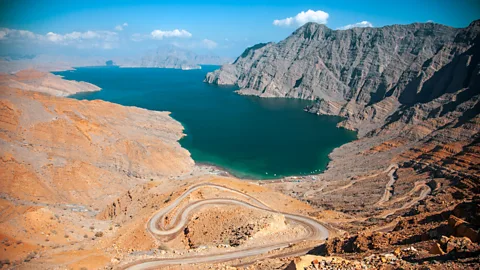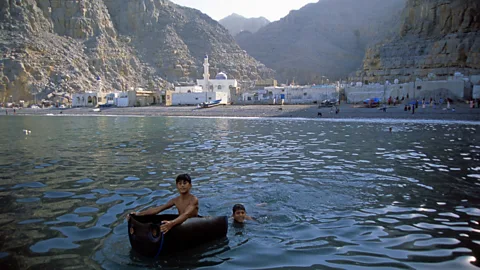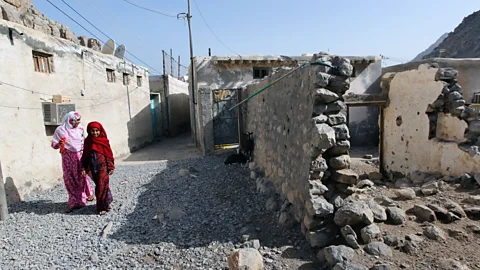Oman's spectacular 'Norway of Arabia'
 CristianDXB/Getty Images
CristianDXB/Getty ImagesSeparated from the rest of the country by 100km of rocky desert, the small village of Kumzar is so gloriously isolated it has developed a language and culture all of its own.
Hidden among the wild fjords of northern Oman, between the mountains and the sea in a quiet bay, sits the small village of Kumzar. This is the country's northernmost frontier, but Kumzar has a distinct atmosphere from the rest of Oman. In fact, its glorious isolation – the village is accessible only by an hour-long speedboat ride or a 2.5-hour trip on a sailing dhow from the nearest city, Khasab – has led Kumzar to develop a language and culture all of its own.
Kumzar's unique character owes much to geography. The village sits on the Musandam Peninsula, a tiny coastal exclave of Oman separated from the rest of the country by 100km of the UAE's rocky desert. Musandam's nickname – 'the Norway of Arabia' – derives from its wildly dramatic coastline, ravaged by fjord-like khors – although, unlike their Scandinavian counterparts, these rocky inlets were formed not by the steady slithering of glaciers but rather by the collision of tectonic plates, which crack the Earth's crust from beneath like terrible creatures vying to emerge from an egg.
 Helmut Corneli/Alamy
Helmut Corneli/AlamyBeyond Kumzar's fjord lies the Strait of Hormuz; beyond that, Iran. For some 700 years, the villagers have been absorbing a farrago of influences from the Strait, long a crucible for foreign trade, culture and geopolitical high drama.
This is reflected most strikingly in the Kumzari language, which is unlike any other. "Kumzari is a mixture of old Persian and Arabic, and other languages like Akkadian, Assyrian, Turkish, English and Hindi," said Makeyya Al Kumzari, a local who studies Kumzari language and culture. "It is spoken here and nowhere else.
The language is a matter of fierce local pride. Moyath Al Kumzari, who captains dhow tours around Musandam, told me: "Kumzari is our mother tongue, and when we're together we don't speak anything else – even though we all know Arabic, too."
Many Kumzari words may sound familiar to English speakers. A star becomes a stārg, lotion is lōšan and a dar is a door. A niglis is a necklace, and, rather pleasingly, a plank becomes a pling. Many of the words that Kumzari takes from Arabic and Persian, meanwhile, sound closer to how they would have been pronounced in the medieval era than in the modern day. The language's unique melange of influences, along with its survival in an overwhelmingly Arabic milieu, has long intrigued linguists like Christina van der Wal Anonby and Erik Anonby, who lived and worked in Kumzar for a year.
 Karim Sahib/Getty Images
Karim Sahib/Getty Images"Kumzar has been at the centre of a socially and historically vibrant regional ecosystem for centuries, so although it can only be reached by boat, it would be a mistake to think about it as 'isolated'," Erik said. "Kumzar was very important historically: one of the few places with a well with plentiful, fresh water, between the trading centres of Basra, Muscat, Zanzibar, India and beyond."
The Anonbys were welcomed into the village as of the community, ing the Kumzaris in their daily routines alongside carrying out their linguistic research. Christina described mornings chatting with the local women over tiny cups of cardamom coffee, and afternoons spent processing dates and fish or weaving palm leaves. She believes this hospitality derives from Kumzar's unique location. "I think they are so welcoming because historically they would regularly take in sailors that had survived shipwrecks in the Strait, hide ships in the fjords when they were fleeing pirates, or replenish ing ships' fresh water supply from the well in Kumzar," she said.
You may also be interested in:
• Japan's forgotten indigenous people
Kumzaris make their living from the fish that live in the khors for nine months of the year, relocating to Khasab to harvest dates when the searing summer heat empties the water of fish. The sea gives Kumzar life, and consequently, Erik explained, Kumzari is a language shaped by the sea. "We've found 200 distinct names for types of fish in Kumzari," he told me, "and many of these words aren't similar to the names of fish found in any other language in the world."
Kumzar's unique geography, packed between sheer mountain walls on three sides and the ocean on the other, has shaped not just its language, but the way its people interpret the world around them. "Rather than using the cardinal directions north, south, east and west," as we do in English and Arabic, "their world is oriented to the directions of 'up', toward the mountains, and 'down' toward the sea," Erik said. Maritime matters are never far away from social interactions either: Kumzaris greet each other with the phrase "či kawlā">window._taboola = window._taboola || []; _taboola.push({ mode: 'alternating-thumbnails-a', container: 'taboola-below-article', placement: 'Below Article', target_type: 'mix' });
